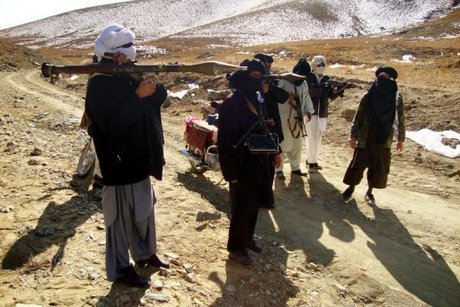Karzai Says Afghan-U.S. Pact Only when Taliban Start Talks with Kabul
إقرأ هذا الخبر بالعربية
The Afghan government on Sunday said talks on a key security pact with the U.S. would only re-start when Taliban rebels meet with Kabul's negotiators, further complicating efforts to revive the country's troubled peace process.
The Taliban have consistently refused to meet the High Peace Council (HPC), the official negotiators of the Afghan government, saying that President Hamid Karzai is a puppet of the United States.
Karzai suspended talks over the security pact, which would allow some U.S. troops to stay in Afghanistan after 2014, in protest at how the Taliban had opened an office in Qatar that appeared as if it was an embassy for the rebels.
"The talks on the security pact that were suspended in reaction to the Taliban's Qatar office can resume when the talks between the HPC and the Taliban begin," a statement from the palace in Kabul said.
Karzai has so far refused to send HPC officials to Qatar, but has not ruled out peace negotiations as long as any talks are rapidly moved to Afghanistan.
The Taliban have also offered a glimmer of hope, saying the Qatar office may be used to meet unspecified Afghans "in due appropriate time" -- seen as a hint that their refusal to talk with the HPC could be negotiable.
The search for a peace deal is an urgent priority as 100,000 U.S.-led NATO combat troops prepare to withdraw next year and Afghan forces take on the fight against the insurgents.
U.S. President Barack Obama recently said he anticipated "a lot of bumps in the road" during the peace process but that it was the only way to end the violence in Afghanistan.
"President Obama hopes to get the security pact between Afghanistan and America by October," Karzai said at a press conference in Kabul on Saturday.
"I told him that we have some clear and unchangeable conditions in this regard, which is peace and security in Afghanistan, guarantee of Afghanistan's national interest, a stable central government and an united Afghanistan."
The size of the "residual" U.S. force has not been agreed, with numbers ranging from 2,500 to 12,000, according to U.S. officials, as Washington winds down a war that has become deeply unpopular at home.
Soldiers kept in Afghanistan would target al-Qaida militants and help train the local army and police.
The U.S. has said its troops would stay after 2014 "only at the invitation" of the Afghan government and that Washington is not seeking permanent bases there.
Immunity from Afghan law for the remaining U.S. troops is likely to be a key demand from Obama, and Karzai has said the issue may have to be decided by a gathering of tribal elders.



